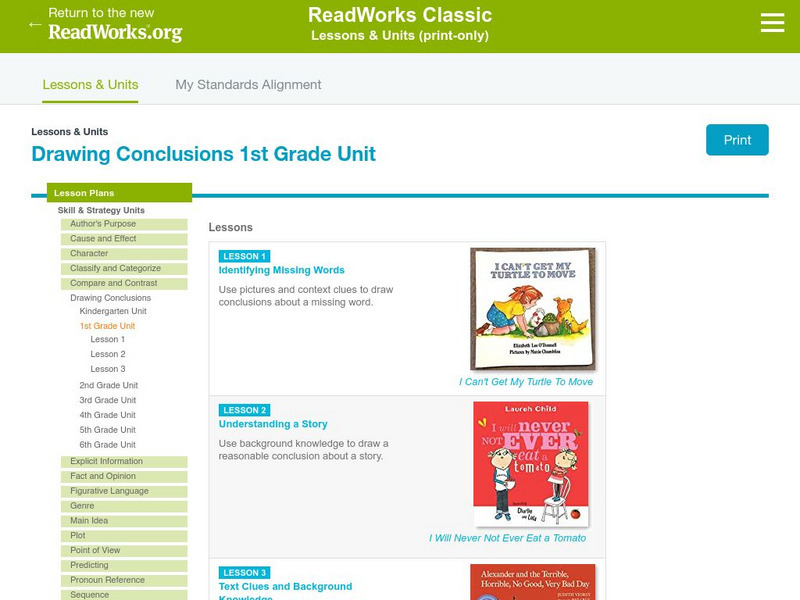Curated OER
Character, You Say? Prove It!
Learners discuss character traits, and complete a character map and a Venn diagram for selected characters in their assigned text.
Curated OER
Building Two Literature Pyramids
Middle schoolers create literature pyramids. They read selections of various societies, eras, and ideas. They complete two pyramid sheets for the same literary element including either plot, character, setting, or theme. They color-code...
Curated OER
One Big Happy Family
Students will explore the role and structure of the family in the target culture and the relationships among family members. The skills help learners make connections to language because the information of the lesson uses personal examples.
Curated OER
During Reading Strategies
Students employ strategies to increase comprehension while they are reading. In this language arts lesson, students must infer, predict and visualize in order to improve comprehension.
Curated OER
Comparing Cultures
Learners examine the nature of culture, and compare/contrast various cultures and their artifacts and ceremonies. They develop a class list of artifacts, complete a worksheet, and create a poster or diorama describing an object that is...
Curated OER
Adapting a Fairy Tale
Students read and prepare a new oral version of a selected fairy tale. They read and compare/contrast two fairy tales and identify the main story elements. In small groups they create a new oral version of one they fairy tales and...
Curated OER
Discover the Real Depression
Eleventh graders take a closer look at living conditions during the Great Depression. In this Great Depression lesson, 11th graders analyze primary source packets that their teachers prepare and then record facts about life...
Curated OER
Survival Under a Rock
Pupils investigate ways that animals adapt to their environments through hands-on activities using isopods and an interactive video.
Curated OER
Germinate Bean Seeds
Students write the steps needed to germinate bean seeds, make predictions and observations and keep an experience journal and complete a chart.
Curated OER
Trash Count
Students identify pollution around their local community. They discuss the sources of polution and categorize objects based on their properties. They discover ways to make changes to the environment and how to inform the public.
Curated OER
Weather Forecasting Basics
Eighth graders analyze weather diagrams and weather maps. In this earth science lesson, 8th graders explain why it is important to know the weather. They complete a handout at the end of the lesson.
Curated OER
Mississippi’s Electricity: From Generation to Consumption
Eighth graders discover how electricity is produced. In this physics lesson plan, 8th graders infer about the future of Mississippi's energy industry. They participate in a Smart Board interactive activity at the end of the lesson plan.
Curated OER
Where Did That Come From?
Fourth graders participate in a scavenger hunt. They locate specified items, finding the country origin. Students collect and organize the data, marking each country on a map. After researching the results, 4th graders write an analysis...
Curated OER
Estimation of Population Growth By Counting Offspring: Seed Multiplication
Young scholars calculate the reproductive rate of a plant that creates multi seed fruits. They graph exponential growth and the complete a series of questions that help them infer that natural selection processes are at work in this...
Curated OER
Lesson 9: Would the Real Portia Please Stand Up?
High schoolers explore the subtext of the two scenes in which Portia appears. They compare the language she uses with her husband Brutus in 2.1 with the language she uses with her boy servant Lucius in 2.4. Students use their analysis of...
Curated OER
What Is It?
Students view photographs of an area where artifacts where recently taken. Using the artifacts, they work together to try to determine the occupations, diet and other information about a specific group of people. They write an artifact...
Curated OER
Mini-Sanitary Landfill
Second graders work in groups to bury a variety of trash items and arrange them in a mini-landfill. They predict which items will biodegrade and then keep records of what the items look like every ten days. Students consider how...
Curated OER
Human Effect
Students investigate changes in air quality. In this science lesson plan, students compare data to determine the air quality. Students explore how humans affect the air quality.
Curated OER
Tracing Migration Patterns
Seventh graders analyze migration patterns. In this migration lesson, 7th graders use U.S. Census records to trace the migration patterns of 2 German families in Kansas.
Curated OER
Using Part To Whole
Students engage in a math lesson that is concerned with developing problem solving skills. They emphasize the cognitive reasoning of seeing parts as pieces to a whole. Writing is integrated into a cross-curricular study of math.
Read Works
Read Works: Drawing Conclusions 3rd Grade Unit
[Free Registration/Login Required] A two-lesson unit on drawing conclusions through which students learn how to recognize the difference between implicit information and drawing conclusions. Students also learn to draw conclusions in...
Read Works
Read Works: Drawing Conclusions 1st Grade Unit
[Free Registration/Login Required] A three-lesson plan unit on drawing conclusions through which students learn how to use pictures and context clues to discover a missing word and to draw conclusions about a story. Students also use...
Texas Education Agency
Texas Gateway: Compare/contrast Themes and Genres in Literary Texts
Determining the theme is not easy; you have to use the clues the author leaves to figure it out yourself. The author implies information about the story through plot points, setting, and characters. You infer and draw conclusions based...
Read Works
Read Works: Drawing Conclusions Kindergarten Unit: Short Story
[Free Registration/Login Required] A lesson plan teaching students to make conclusions based on a sentences and short texts. Students use textual cues to explain how the conclusions were reached. Ideas for direct teaching, guided...























